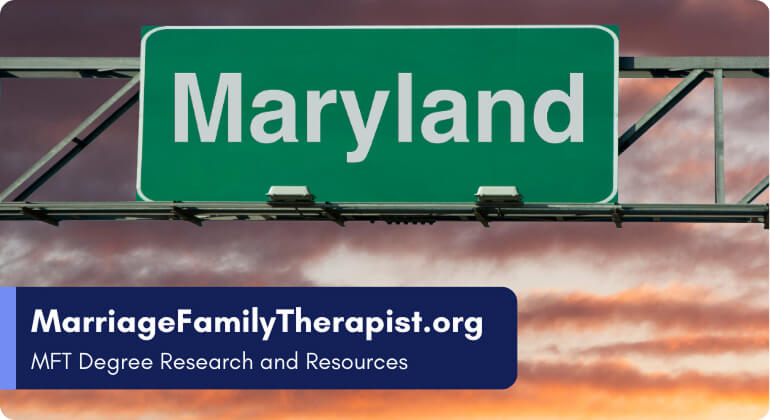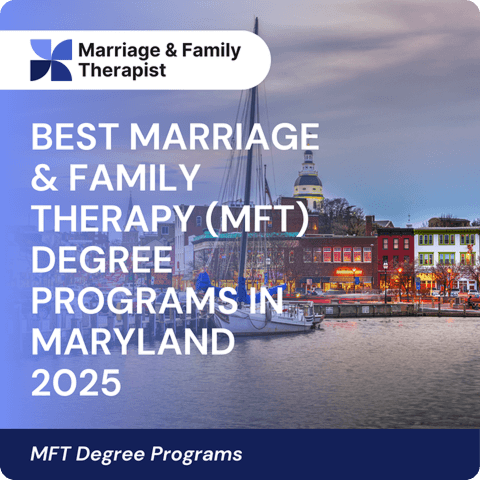Best Marriage & Family Therapy (MFT) Degree Programs in Maryland 2025
Maryland offers several accredited Marriage and Family Therapy (MFT) programs, making it an excellent location for students looking to enter the mental health profession. The state has a strong demand for licensed therapists, particularly in urban areas like Baltimore and Silver Spring, where mental health services continue to expand. In addition to private practice and hospital-based therapy, many LMFTs in Maryland work in government-funded behavioral health initiatives, school-based mental health programs, and military family support services due to the state’s proximity to Washington, D.C.
MFT programs in Maryland emphasize clinical training in family systems, trauma-informed care, addiction counseling, and cultural competency. Many programs integrate internship placements with local healthcare providers and nonprofit organizations, allowing students to gain valuable real-world experience before graduation. Maryland’s MFT programs also place a strong focus on teletherapy training, preparing students to work in both in-person and virtual mental health settings.
Students in Maryland have access to traditional on-campus programs, hybrid models, and fully online learning options, providing flexibility for working professionals and those transitioning from other careers. Many MFT programs in the state offer specializations in areas such as marriage counseling, child and adolescent therapy, and military family services, ensuring that graduates are well-equipped to work in diverse mental health environments.
In this guide
2026 Best Marriage & Family Therapy (MFT) Programs in Maryland
University of Maryland-College Park
College Park, MD - Public 4-Year - umd.edu
Master's - MS, Couple and Family Therapy
Campus Based - Visit Website
The University of Maryland-College Park offers a Master of Science in Couple and Family Therapy that prepares graduates for diverse therapeutic roles through a comprehensive 45-51 credit curriculum. Accredited by COAMFTE, this program emphasizes ethical practice and therapeutic skills while focusing on working with diverse populations. Students complete a two-year internship, gaining extensive supervised clinical experience that ensures robust professional development and readiness for national licensing exams. Admission occurs in the fall semester with a December 1st application deadline. This program does not require an entrance exam.
- COAMFTE Accredited Program
- 45-51 Credit Curriculum
- Two-Year Internship Included
- Fall Semester Admission
- December 1st Application Deadline
- Diverse Populations Focus
- National Licensing Exam Preparation
- Extensive Clinical Training
- Professional Therapeutic Skills
- Comprehensive Counseling Curriculum
Mount St. Mary's University
Emmitsburg, MD - Private 4-year - msmary.edu
Master's - Master of Science in Counseling Psychology with a specialization in Marriage and Family Therapy (Marriage and Family Therapy)
Campus Based - Visit Website
Mount St. Mary's University offers a Master of Science in Counseling Psychology with a Marriage and Family Therapy specialization, providing rigorous training in evidence-based counseling practices. This campus-based program emphasizes cultural competence and critical thinking, preparing students for licensure in California and other states. While no entrance exam is required, applicants need a minimum 3.0 undergraduate GPA and introductory psychology prerequisite. As a Roman Catholic institution that is military-friendly, it focuses on developing advanced communication skills through diverse teaching methods, ensuring graduates are well-equipped for professional counseling roles in marriage and family therapy.
- California Board of Behavioral Science approved
- Three counseling specializations offered
- Minimum 3.0 undergraduate GPA required
- Introductory Psychology prerequisite
- Evidence-based counseling practices
- Culturally competent training approach
- Licensure preparation for MFT/LPCC
MFT Programs in Maryland
MFT programs in the Maryland emphasize evidence-based therapy models, ethical counseling practices, and psychological assessment techniques. Most programs also require students to complete supervised practicum and internship experiences, which provide hands-on training in community mental health clinics, hospitals, and school counseling programs.
Many graduates from Maryland’s MFT programs pursue careers in government-funded behavioral health agencies, private practices, hospitals, and family counseling centers, where they work with individuals, couples, and families experiencing relational and psychological challenges.
While specific course titles and sequencing may vary among programs, the following core areas are generally covered:
1. Foundations of Marriage and Family Therapy:
This introductory section lays the groundwork for understanding the systemic perspective that defines MFT.
- Course Examples:
- Introduction to Marriage and Family Therapy: Explores the history, philosophy, and core concepts of MFT, including systems theory, circular causality, and the relational context of problems.
- Family Systems Theory: Delves deeper into the major systems theories that inform MFT practice, such as Bowen Family Systems Theory, Structural Family Therapy, and Strategic Family Therapy.
- Multicultural Issues in Marriage and Family Therapy: Examines the impact of culture, ethnicity, race, gender, sexual orientation, socioeconomic status, and other forms of diversity on family dynamics and therapeutic interventions.
2. MFT Theory and Practice Models:
This section focuses on specific therapeutic models and techniques used in MFT. You’ll learn how to apply these models to a variety of clinical issues.
- Course Examples:
- Couple Therapy: Focuses on interventions for working with couples experiencing relationship distress, communication problems, intimacy issues, infidelity, and other challenges.
- Child and Adolescent Therapy: Covers developmental considerations and therapeutic approaches for working with children and adolescents within a family context, addressing issues such as behavioral problems, anxiety, depression, and trauma.
- Advanced Family Therapy Techniques: Explores more advanced MFT models, such as Emotionally Focused Therapy (EFT), Narrative Therapy, and Solution-Focused Therapy, providing opportunities to practice applying these techniques in simulated clinical settings.
3. Human Development and Family Development:
This section provides a foundational understanding of the developmental processes that shape individuals and families across the lifespan.
- Course Examples:
- Lifespan Development: Examines the physical, cognitive, emotional, and social development of individuals from infancy to old age, with an emphasis on the impact of family relationships on development.
- Family Development: Explores the stages of family life, transitions, and challenges families face throughout the life cycle, including marriage, parenthood, divorce, and remarriage.
4. Psychopathology and Mental Health:
This section covers the diagnosis and treatment of mental health disorders within a family context.
- Course Examples:
- Psychopathology: Provides an overview of major mental health disorders, including diagnostic criteria, etiology, and treatment approaches, with a focus on the impact of these disorders on family relationships.
- Assessment in Marriage and Family Therapy: Covers the use of various assessment tools to evaluate individuals, couples, and families, including standardized questionnaires, genograms, and clinical interviews.
5. Research Methods and Statistics:
This section equips you with the skills to critically evaluate research and apply evidence-based practices to your clinical work.
- Course Examples:
- Research Methods in Marriage and Family Therapy: Introduces research designs, data collection methods, and statistical analysis techniques used in MFT research.
- Evidence-Based Practice in Marriage and Family Therapy: Explores the process of identifying, evaluating, and implementing evidence-based interventions in MFT practice.
6. Ethics and Professional Practice:
This section covers the ethical and legal considerations that guide MFT practice.
- Course Examples:
- Ethics and Professional Issues in Marriage and Family Therapy: Explores the ethical codes of conduct for MFTs, legal issues related to confidentiality, informed consent, and mandated reporting, and professional development strategies.
Maryland’s Quickest MFT Programs
Some universities in Maryland offer accelerated MFT programs, allowing students to complete their degree in as little as two years with a structured, full-time course load. Several programs integrate clinical experience into the first year of study, ensuring that students can begin accumulating their supervised hours early and move into professional practice sooner.
Hybrid and online programs provide additional flexibility, allowing students to take on more coursework per semester while gaining practical experience through local clinical placements. Those with previous coursework in psychology, counseling, or social work may be able to apply transfer credits toward elective or foundational courses, further reducing the time required for degree completion.
Since Maryland has a strong mental health workforce, students can often find internship and practicum opportunities at local hospitals, government agencies, and private counseling practices, enabling them to meet licensure requirements efficiently while still in school.
Maryland’s Cheapest MFT Programs
The cost of obtaining an MFT degree in Maryland varies depending on the institution, program format, and financial aid availability. Public universities tend to offer lower tuition rates for in-state residents, making them a more affordable choice for students seeking a cost-effective degree.
Hybrid and online learning options can also help reduce costs by allowing students to continue working while pursuing their degree. Many programs provide financial aid packages, scholarships, and graduate assistantships, which help offset tuition expenses. Additionally, Maryland has state and federal loan forgiveness programs for LMFTs who work in underserved communities, school-based therapy programs, and government-funded behavioral health agencies.
Many mental health employers in Maryland offer tuition reimbursement for employees seeking advanced licensure, making employer-sponsored education a viable option for reducing overall educational costs.
How to Become Licensed as an LMFT in Maryland
Step 1: Earn a Master’s or Doctorate in Marriage and Family Therapy
The first step toward becoming an LMFT in Maryland is completing a COAMFTE-accredited or state-approved graduate program in Marriage and Family Therapy or a related mental health field. Coursework must include family therapy theories, clinical assessment, professional ethics, and mental health diagnosis.
Step 2: Complete 2,000 Hours of Supervised Experience
Maryland requires LMFT candidates to complete 2,000 hours of supervised clinical experience, with at least 1,000 hours in direct client contact. These hours must be overseen by a licensed MFT or equivalent mental health professional, ensuring that candidates develop strong clinical skills in individual, couple, and family counseling.
Step 3: Pass the National MFT Examination
All candidates must pass the Association of Marital and Family Therapy Regulatory Boards (AMFTRB) National MFT Exam, which evaluates an individual’s clinical knowledge, ethical judgment, and ability to diagnose and treat relational issues.
This exam ensures that LMFTs in Maryland meet professional standards for providing effective and ethical therapy services.
Step 4: Apply for Licensure Through the Maryland Board of Professional Counselors and Therapists
After meeting all educational and clinical requirements, applicants must submit their official transcripts, verification of supervised hours, exam scores, and background check results to the Maryland Board of Professional Counselors and Therapists. A licensing fee is also required.
Once approved, candidates receive their LMFT license, allowing them to practice independently in the state.
Step 5: Maintain Licensure Through Continuing Education
To keep their license active, LMFTs in Maryland must complete 40 continuing education (CE) hours every renewal cycle, including coursework in professional ethics, trauma-informed care, and advanced clinical skills.
Continuing education ensures that therapists remain updated on best practices, emerging treatment methods, and regulatory changes in mental health care.
LMFT Career & Salary Outlook in Maryland
The mental health sector in Maryland offers strong job prospects for LMFTs, with many employment opportunities in private practice, hospitals, government agencies, and school-based therapy programs. The average salary for LMFTs in Maryland is $64,800 per year, with experienced professionals earning upwards of $90,000 annually.
Salaries tend to be higher in urban areas like Baltimore, Bethesda, and Silver Spring, where mental health services are in high demand. In addition to traditional therapy roles, many LMFTs find work in state-funded behavioral health programs and military family support services, given Maryland’s proximity to Washington, D.C.
The state has been expanding teletherapy services, providing additional job opportunities for LMFTs who wish to work in remote counseling or hybrid therapy settings. With a growing emphasis on mental health accessibility, Maryland continues to be a top state for MFT professionals seeking diverse and rewarding career paths.


Related Articles
- LMFT vs MFT: Is Licensure Necessary for Your Therapy Career?
- Who Will You Treat as a Marriage & Family Therapist? A Career Guide for Aspiring MFTs
- Support That Affirms: Navigating Mental Health as LGBTQ+
- The ROI of an MFT Degree: Analyzing the Financial Investment in Your Therapy Career
- MFT Doctorate Degrees: DMFT vs PhD – Who Should Pursue Each Path?
- From Student to Therapist: What to Expect in Your MFT Clinical Internship